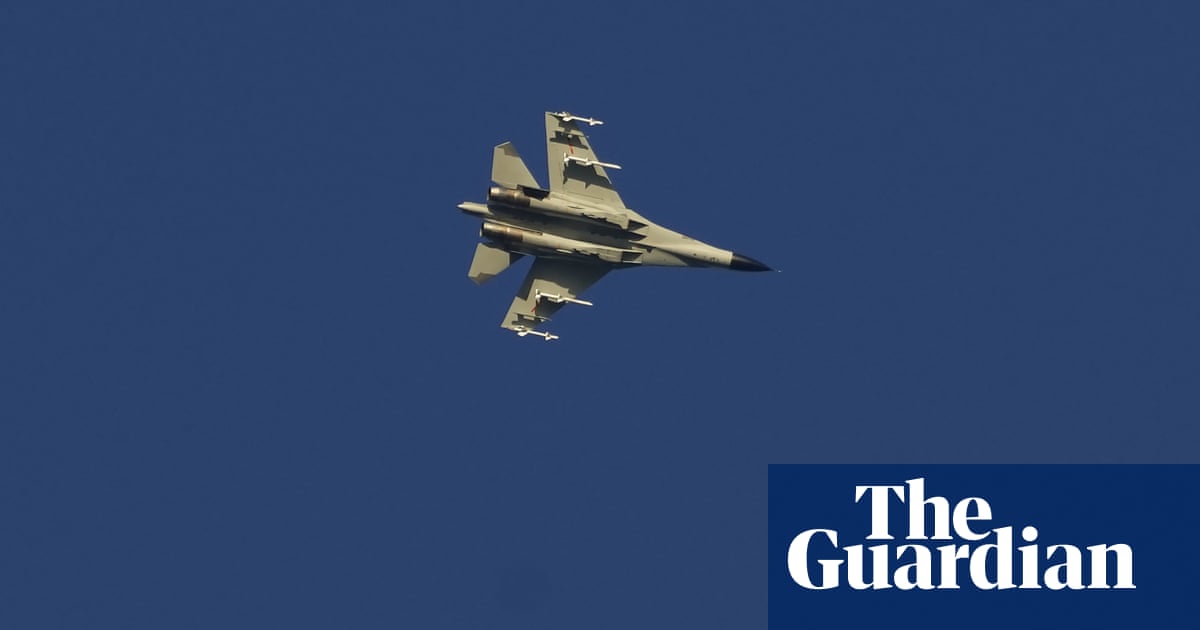China halts military drills around Taiwan but ‘war preparation’ continues
Beijing has announced an end to its military drills surrounding Taiwan but said further “training and war preparation” would continue.
It made the announcement shortly after reaffirming its commitment, in a major policy paper, to use force against Taiwan if it could not take control “by peaceful means”.
A spokesperson for the PLA Eastern Theater Command said on Wednesday afternoon the exercises had been successfully completed, and “effectively tested the integrated joint combat capabilities of the troops”, according to state media.
The statement pledged to continue monitoring the Taiwan strait, regularly patrol the area and remain ready for combat.
After the US House speaker, Nancy Pelosi, visited Taiwan last week, Beijing’s People’s Liberation Army (PLA) launched live-fire military exercises in seven large zones closely surrounding Taiwan’s main island.
Taiwan’s foreign minister, Joseph Wu, accused China on Tuesday of using the military drills to prepare for invasion. On Wednesday, Pelosi defended her visit, saying it was “absolutely” worth it.
“We cannot allow the Chinese government to isolate Taiwan,” Pelosi said in an interview with NBC. “They’re not going to say who can go to Taiwan.”
The Chinese Communist party government (CCP) claims Taiwan as a breakaway province of China. In a white paper released through state media on Wednesday morning, it reiterated its resolve to annex Taiwan by force if peaceful means were unsuccessful.
“We will work with the greatest sincerity and exert our utmost efforts to achieve peaceful reunification,” the official English-language version of the document said. “But we will not renounce the use of force, and we reserve the option of taking all necessary measures.”
Titled The Taiwan Question and China’s Reunification in the New Era, the official document did not give a timeline but did say: “We should not allow this problem to be passed down from one generation to the next.”
It said the use of force would be a “last resort taken under compelling circumstances”, and did not target “fellow Chinese in Taiwan”.
“This is to guard against external interference and all separatist activities,” the document said. It also claimed unification was the only way to avoid Taiwan being invaded by another country.
It was the third paper on Taiwan released by the state council, after one in 1993 and another in 2000. According to Reuters, it removed a promise stated in the previous two papers “to not send troops or administrative personnel to be based in Taiwan” after “unification”.
Wednesday’s paper reiterated Beijing’s intention of initially ruling Taiwan under the “one country, two systems” framework, and proffered Hong Kong as an example of the policy’s “resounding success” after “appropriate improvements” were made in the crackdown after the 2019 protest movement.
The recent crackdown on Hong Kong and imposition of Beijing’s national security law has been a major driver in the Taiwan population’s overwhelming rejection of the prospect of CCP rule. Hong Kong’s treatment featured heavily in the presidential campaign of Tsai Ing-wen, who was elected in a landslide.
Wednesday’s white paper also included erroneous interpretations of foreign governments’ “One China” policies, and blamed Taiwan’s ruling Democratic Progressive party and the US for fomenting “separatist” forces. It said unification was the only way to stop Taiwan from being invaded by another country.
“Separatism will plunge Taiwan into the abyss and bring nothing but disaster to the island,” it said.
Dr Lin Ying-yu, of Tamkang University’s Graduate Institute of International Affairs and Strategic Studies, said the document was likely to have been timed to coincide with the military drills. “After the sabre-rattling, they verbally intimidate,” Lin said. “They hope to make Taiwanese people respond in different ways and [to divide] opinions.”
Dr Mark Harrison, a senior lecturer in Chinese studies at the University of Tasmania, said the paper demanded Taiwanese people abandon the decades-long aspirations for democracy and sovereignty they have strived for since Japanese colonisation in the early 20th century, before the People’s Republic of China existed.
“The concluding references to Beijing’s willingness to use ‘all necessary measures’ and its identification of ‘separatist elements or external forces’ is a disquieting sign of the arguments it is preparing to justify military action against Taiwan,” said Harrison.
China’s ambassador to Australia, Xiao Qian, appeared to be the first Chinese official to be questioned by media on the white paper, at a national press club event on Wednesday afternoon. Xiao would not be drawn on what constituted a “compelling circumstance” justifying the use of force, and said people should “use your imagination” for the definition of “all necessary means”.
Xiao was also asked about comments by his fellow ambassador in France, that Taiwan’s people would be “reeducated” after annexation. The comment sparked alarm, appearing to align with Beijing’s efforts to “re-educate” Uyghurs in Xinjiang.
Xiao said he was not aware of any official policy regarding reeducation in Taiwan but his personal understanding was that “once Taiwan is reunited … there might be a process for the people in Taiwan to have a correct understanding of China, about the motherland”.
Additional reporting by Chi Hui Lin













